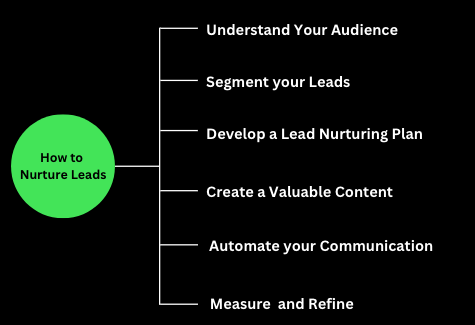Lead Nurturing
Definition
Lead nurturing is developing relationships with potential customers (leads) through various communication channels, such as email, social media, and content marketing, to guide them through the sales funnel and convert them into paying customers.
Description
Businesses flourish with long term relationships established with the customers. Brands try hard to maintain their bits to keep their customers engaged.
This defines nurturing leads because any customer will come back to or think about your brand only if they feel that they are served well.
It involves using targeted communication and content to engage with leads at various sales funnel stages to provide value and build trust.
Lead nurturing typically involves a series of interactions with leads, such as email campaigns, social media engagement, and personalized content.
These interactions are designed to keep the leads interested and engaged and to help them move through the sales funnel from awareness to consideration and ultimately to purchase.
Effective lead nurturing requires a deep understanding of the needs and interests of the target audience and the ability to deliver relevant content and communication that resonates with them.
It is a critical part of the sales and marketing process, as it can help to increase conversion rates and drive revenue growth.
Importance of Lead Nurturing
Lead nurturing is an essential component of any successful sales and marketing strategy. Here are some of the key reasons why lead nurturing is essential:
- Builds Trust: By providing valuable information and relevant content, lead nurturing helps establish trust between the potential customer and the business. This can increase the likelihood of the lead eventually becoming a paying customer.
- Increases Conversion Rates: Effective lead nurturing can increase conversion rates by providing leads with the information they need at each stage of the buying process. This can move leads through the funnel and convert them into paying customers.
- Reduces Sales Cycles: Lead nurturing can help to reduce sales cycles by keeping potential customers engaged and informed. By providing the correct information at the right time, businesses can speed up the buying process and close deals faster.
- Improves Customer Retention: Lead nurturing can also help improve customer retention by providing value and support after the sale has been made. This helps build long-term relationships and increase customer loyalty.
- Cost-Effective: Lead nurturing is often more cost-effective than other forms of marketing and advertising, as it focuses on building relationships with existing leads rather than targeting new prospects. This can help increase marketing efforts’ ROI and drive revenue growth.
How to nurture leads?
There are several effective strategies for nurturing leads. Here are some key steps to follow:

- Understand Your Audience: To effectively nurture leads, you must understand their needs, interests, and pain points. Use tools like customer surveys, website analytics, and social media listening to gather insights and create detailed buyer personas.
- Segment Your Leads: Not all leads are the same, so it’s important to segment them based on factors such as demographics, behavior, and buying stage. This allows you to deliver targeted and personalized content that resonates with each group.
- Develop a Lead Nurturing Plan: Create a plan that outlines your goals, target segments, communication channels, and content strategy. This can include email campaigns, social media engagement, and personalized content such as eBooks, webinars, and whitepapers.
- Create Valuable Content: Develop content that addresses the needs and interests of your target audience at each stage of the buying process. This can include educational content, product demos, case studies, and testimonials.
- Automate Your Communication: Use marketing automation tools to automate your communication and deliver targeted messages based on lead behavior and preferences. This can save time and ensure consistent communication.
- Measure and Refine: Monitor your lead nurturing campaigns and measure key metrics such as open, click-through, and conversion rates. Use this data to refine your approach and optimize your campaigns over time.
How to prepare future strategies of lead nurturing?
As technology and consumer behavior evolve, the future of lead nurturing will likely involve several new strategies and trends. Here is some potential future strategies for lead nurturing:
- Artificial Intelligence: AI-powered chatbots and virtual assistants can provide personalized communication with leads at scale. Businesses can use machine learning to analyze lead behavior and preferences to deliver highly targeted and relevant content.
- Predictive Analytics: Predictive analytics can help businesses to identify leads with the highest likelihood of conversion and deliver targeted communication and content to them. Businesses can optimize their information nurturing efforts and improve their ROI by leveraging data and machine learning.
- Account-Based Marketing (ABM): Account-based Marketing ABM involves targeting high-value accounts with personalized communication and content. This can include creating customized landing pages, personalized email campaigns, and one-to-one interactions with key decision-makers.
- Video Marketing: Video marketing is becoming increasingly popular to engage with leads and deliver value. Businesses can create video content that showcases their products and services, provides educational content, and builds trust with potential customers.
- Omnichannel Nurturing: With consumers using multiple channels and devices to engage with businesses, omnichannel nurturing delivers a consistent and seamless experience across all touchpoints. This can involve integrating email, social media, chatbots, and other communication channels to create a cohesive customer journey.
Benefits of Lead Nurturing
Lead nurturing offers a range of benefits for businesses, including:
Increased Customer Loyalty: Effective lead nurturing can help build long-term relationships with customers, increasing their loyalty and likelihood of recommending the business to others.
Improved ROI: By optimizing lead nurturing efforts and tracking key metrics, businesses can improve their ROI and drive revenue growth.
Better Qualified Leads: By nurturing leads, businesses can better qualify them by identifying those genuinely interested in their products or services, reducing the risk of wasted time and resources.
Greater Brand Awareness: Lead nurturing can help increase brand awareness by delivering targeted and valuable content to potential customers, even if they still need to be ready to purchase.
Example
One example of a brand that has successfully implemented lead nurturing is HubSpot. HubSpot is a marketing, sales, and customer service software provider and has a strong reputation for its lead-nurturing strategies.
HubSpot uses a variety of tactics to nurture leads, including personalized email campaigns, social media engagement, and targeted content such as eBooks and webinars.
They also provide educational resources like blogs and online courses to help potential customers learn more about their products and services.
HubSpot’s lead nurturing approach is focused on delivering value and building relationships with potential customers at each stage of the buying process. By providing personalized and targeted content, they can engage with leads and move them closer to a purchase decision.
Through its lead nurturing efforts, HubSpot has established a strong brand presence and attracted a large and loyal customer base.
In addition, their approach has helped them to improve conversion rates, reduce sales cycles, and drive revenue growth, making them a prime example of effective lead nurturing in action.
FAQs
What is lead nurturing?
Lead nurturing is building relationships with potential customers by providing them with relevant and personalized information at each stage of the buying process.
Why is lead nurturing important?
Lead nurturing is important because it helps increase conversion rates, reduce sales cycles, and build long-term customer relationships. By providing valuable and targeted content, businesses can engage with leads and move them closer to a purchase decision.
How can businesses nurture leads?
Businesses can nurture leads through various tactics, including personalized email campaigns, social media engagement, targeted content such as eBooks and webinars, and one-to-one interactions with key decision-makers.
What are the benefits of lead nurturing?
The benefits of lead nurturing include improved conversion rates, reduced sales cycles, increased customer loyalty, cost-effectiveness, improved ROI, better-qualified leads, and greater brand awareness.
What are some future strategies for lead nurturing?
Future strategies of lead nurturing may include the use of artificial intelligence, predictive analytics, account-based marketing, video marketing, and omnichannel nurturing.
What is the role of technology in lead nurturing?
Technology plays a critical role in lead nurturing, enabling businesses to automate and optimize their efforts.
Technology can help businesses to deliver personalized and targeted content at scale, track key metrics, and improve their ROI.





We would love to have your opinion.